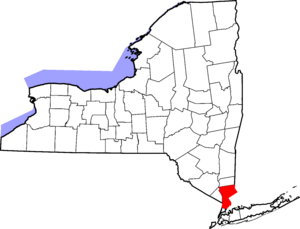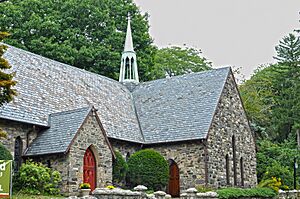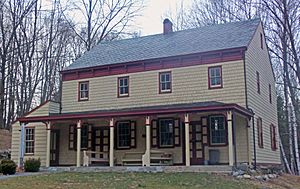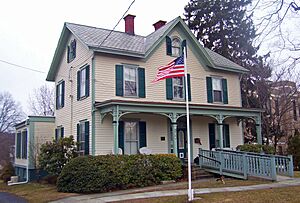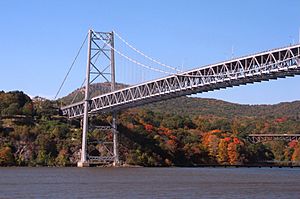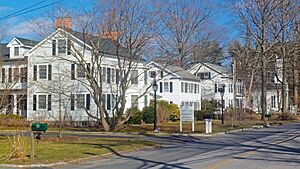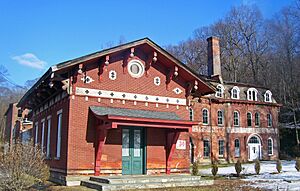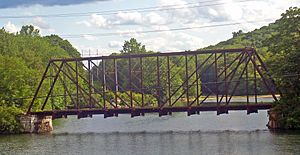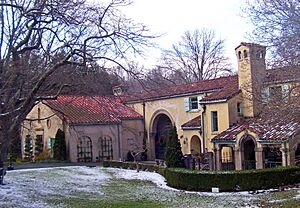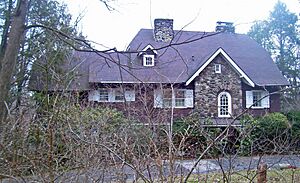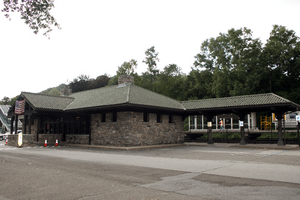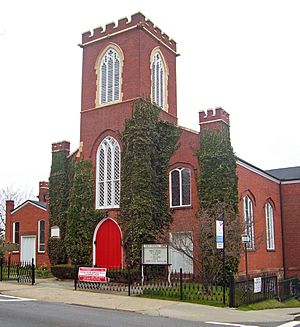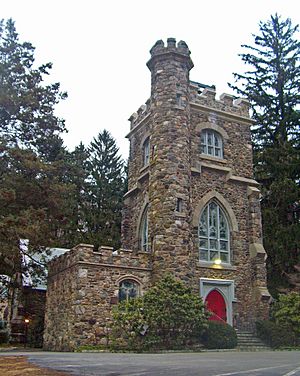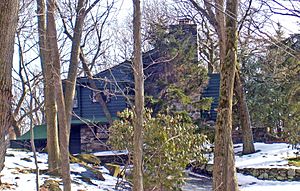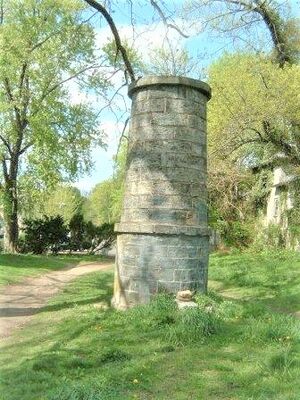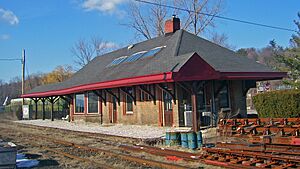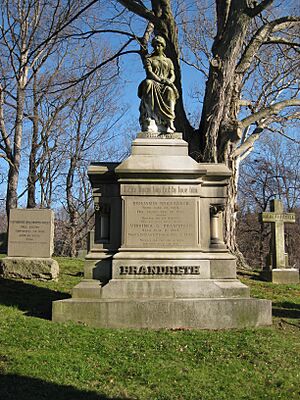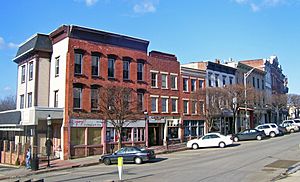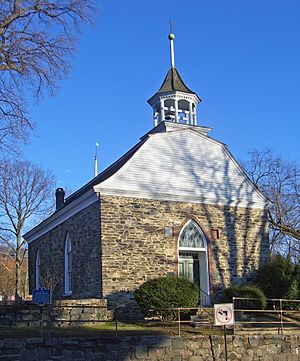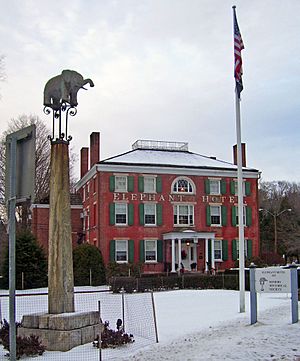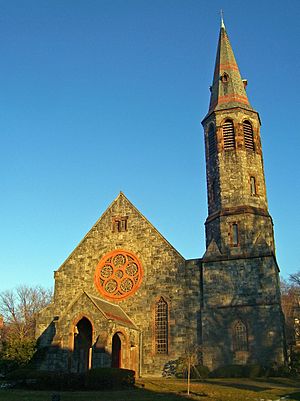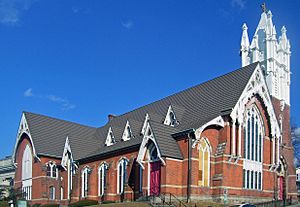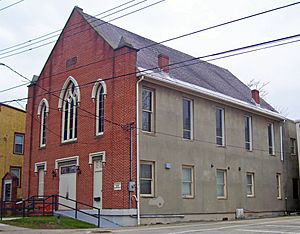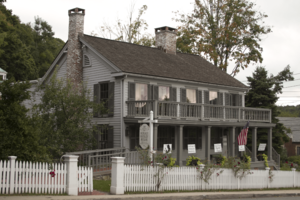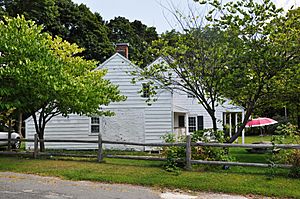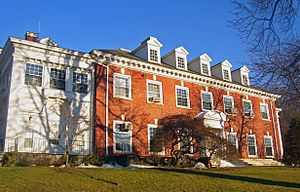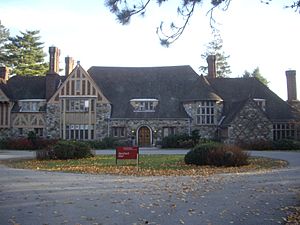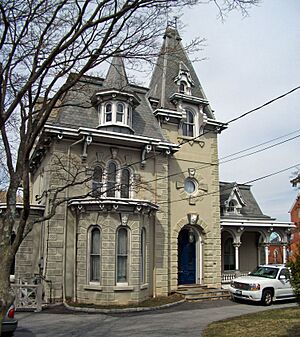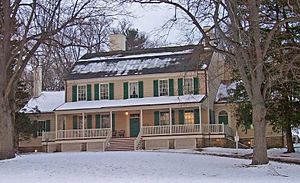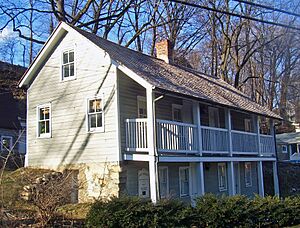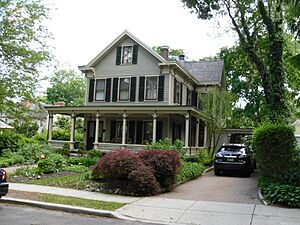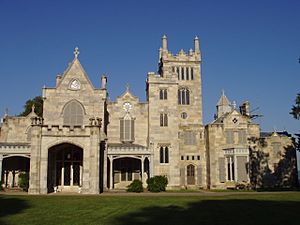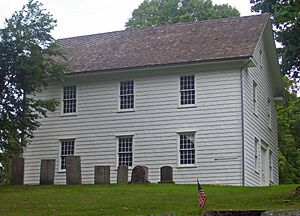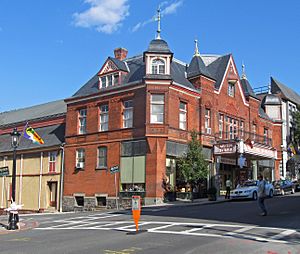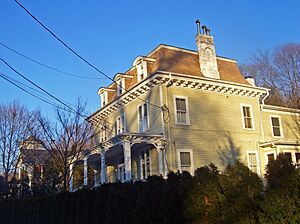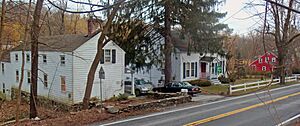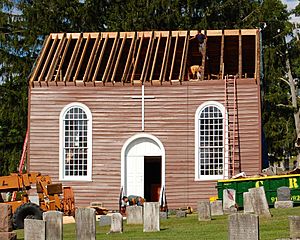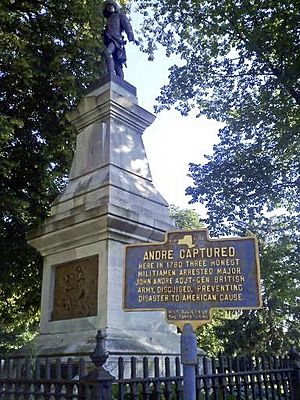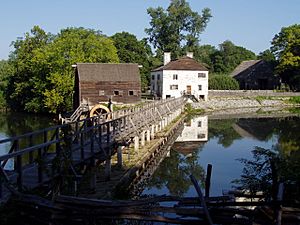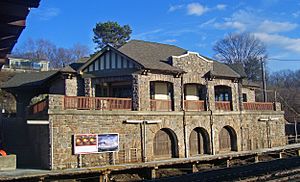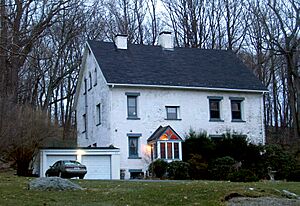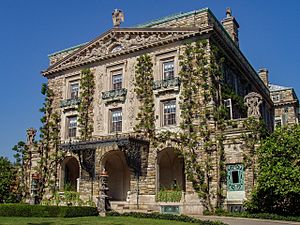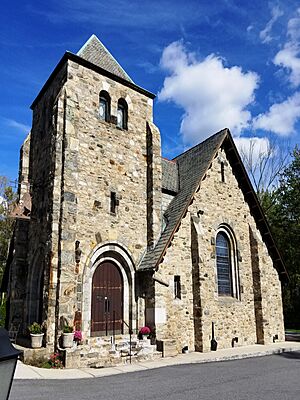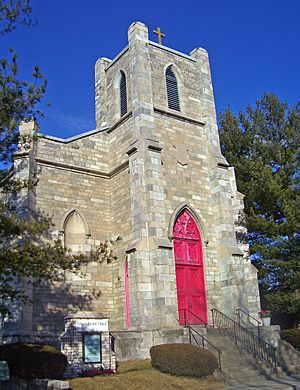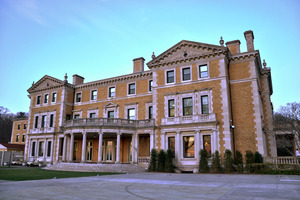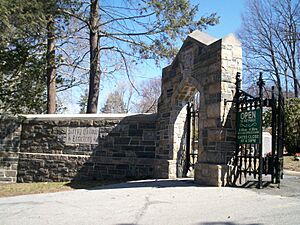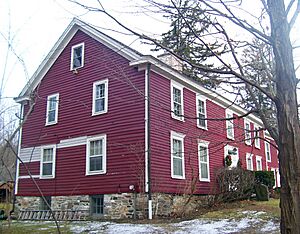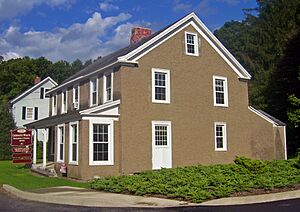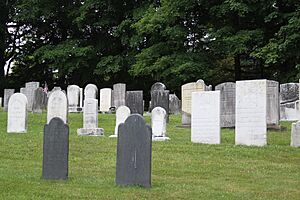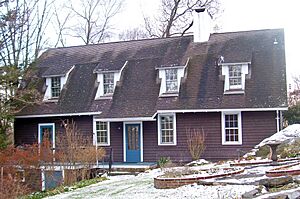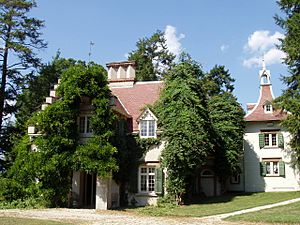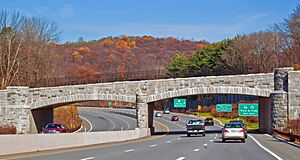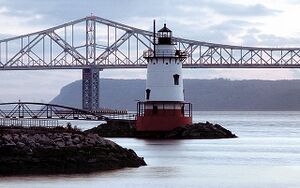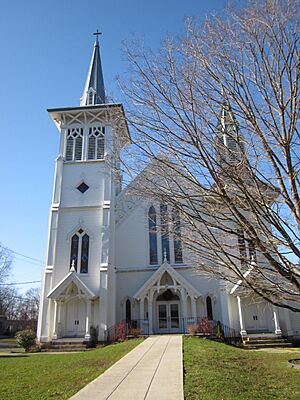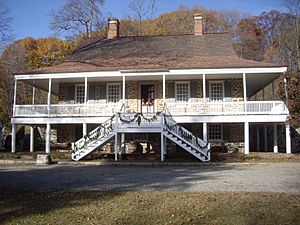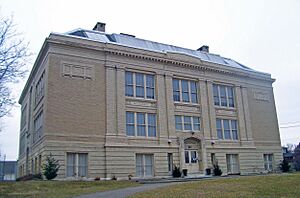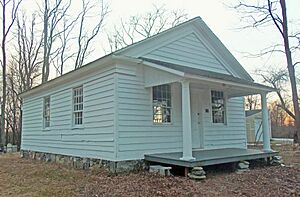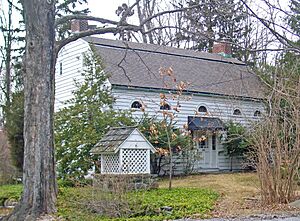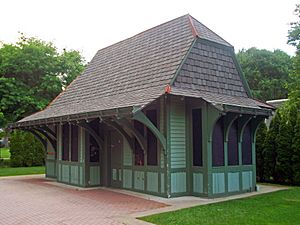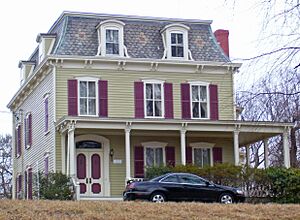National Register of Historic Places listings in northern Westchester County, New York facts for kids
Have you ever wondered about the cool, old buildings and places around you? In northern Westchester County, New York, there are many special spots listed on the National Register of Historic Places. This list helps protect places that are important to American history, architecture, or culture. Think of it like a Hall of Fame for buildings and areas!
This article will tell you about some of these amazing places in northern Westchester County, New York. We won't be looking at the city of Peekskill, as it has its own separate list.
What is the National Register of Historic Places?
The National Register of Historic Places (NRHP) is the official list of places in the United States that are worth saving. These places could be buildings, neighborhoods, archaeological sites, or even objects. Being on the NRHP means a place is recognized for its importance to history, architecture, engineering, or culture. It also helps protect these sites and can offer support for their preservation.
Why are these places important?
These historic places help us understand the past. They show us how people lived, worked, and built things long ago. Some places are important because famous people lived there, or big events happened there. Others are special because of their unique design or how they were built. Protecting them means future generations can also learn from and enjoy them.
Exploring Northern Westchester's Historic Gems
Northern Westchester County is full of interesting towns and villages, each with its own history. The places on this list are found in communities like:
- Bedford (including Bedford Corners, Bedford Hills)
- Cortlandt (including Buchanan and Croton-on-Hudson)
- Lewisboro (including Cross River, Goldens Bridge, South Salem, Waccabuc)
- Mount Kisco
- Mount Pleasant (including Briarcliff Manor, Pleasantville, Sleepy Hollow, Hawthorne, Pocantico Hills, Thornwood)
- New Castle (including Chappaqua and Millwood)
- North Castle (including Armonk)
- North Salem (including Croton Falls and Purdys)
- Ossining (including the village of Ossining)
- Pound Ridge
- Somers (including Amawalk, Baldwin Place, Lincolndale, Whitehall Corners)
- The village of Tarrytown
- Yorktown (including Jefferson Valley, Mohegan Lake, Shrub Oak, Yorktown Heights)
Out of 239 historic places in Westchester County, 98 are in the northern part. Twelve of these are extra special and are called National Historic Landmarks (NHLs).
Notable Historic Places in Northern Westchester
All Saints Episcopal Church (Briarcliff Manor)
This beautiful stone church was built in 1854. It's designed in the English Gothic style, which means it looks a lot like old churches you might see in England.
Amawalk Friends Meeting House (Somers)
Built in 1831, this Quaker meeting house is very well-preserved. It's special because it was built by a group called "Hicksites" during a time when Quakers had a split. The famous war photographer Robert Capa and many of his family members are buried in the nearby cemetery.
Richard Austin House (Ossining)
This house from 1878 is a great example of the Gothic Revival style. It's one of the few homes in Ossining from the early days of suburban growth that is still completely original.
Bear Mountain Bridge (Cortlandt)
Opened in 1924, this was the very first bridge built across the Hudson River north of New York City. It was a huge engineering achievement for its time! The road leading to it, built as a private toll road, is also historic.
Bedford Road Historic District (Armonk)
This small area has a group of houses and a church from the mid-1800s. They show the Federal and Greek Revival styles, which are quite rare to see together in this area. This district marks the very beginning of the settlement of Armonk.
Brandreth Pill Factory (Ossining)
Built in the 1830s by Benjamin Brandreth, this factory was the start of industrial development in Ossining. It operated for over 100 years, until the 1940s. Sadly, much of it was taken down in 2015 after damage from a big storm.
Bridge L-158 (Goldens Bridge)
This bridge, built in 1883, is the only remaining "double-intersection Whipple truss" rail bridge in New York. It was moved to Goldens Bridge in 1904 and hasn't been used since 1960. It's a cool piece of railroad history!
Caramoor Center for Music and the Arts (Bedford)
This beautiful estate from the 1930s is designed in the Renaissance Revival style. Today, it's a famous place where people go to enjoy classical music concerts.
Carrie Chapman Catt House (Briarcliff Manor)
This was the home of Carrie Chapman Catt, a very important leader in the women's suffrage movement. She lived here when the 19th Amendment was passed, which gave women the right to vote.
Chappaqua Railroad Depot and Depot Plaza (Chappaqua)
This train station and park from 1902 are still used today! The land was given by the daughter and son-in-law of Horace Greeley, a famous newspaper editor. The park has a war memorial and a statue of Greeley himself.
Christ Episcopal Church (Tarrytown)
Built in 1837, this church is one of the earliest examples of Gothic Revival architecture in America. The famous author Washington Irving, who wrote "The Legend of Sleepy Hollow," was a member here, and his special pew is still kept safe.
Church of Saint Mary the Virgin and Greeley Grove (Chappaqua)
In 1856, Horace Greeley planted a grove of trees here to help stop the wind and to reforest the area. Later, in 1904, his daughter and son-in-law built a private chapel nearby, which eventually became an Episcopal church.
Aaron Copland House (Cortlandt Manor)
This was the home of the famous American composer Aaron Copland for the last 30 years of his life. He created many of his well-known musical pieces here.
Old Croton Aqueduct (Various Cities)
This amazing structure was the first long-distance aqueduct built to bring fresh water from upstate New York to New York City. It was an incredible feat of engineering for its time! Today, much of it is used as a linear park, where people can walk and bike.
Croton North Railroad Station (Croton-on-Hudson)
This train station from 1890 is still in great condition and is now used as offices. It's a perfect example of what commuter rail stations looked like back then. Two old train cars are even included in the listing!
Dale Cemetery (Ossining)
Opened in 1851, this cemetery is the final resting place for many important local figures, including Benjamin Brandreth, who started the famous pill factory. The town now owns this historic cemetery.
Downtown Ossining Historic District (Ossining)
This area is the heart of Ossining village. It shows how the town grew after the Old Croton Aqueduct was built and after some big fires in the 1870s.
Old Dutch Church of Sleepy Hollow (Sleepy Hollow)
This stone church, built in 1685 by Dutch settlers, is the oldest church in New York State! It's also famous for being a key setting in Washington Irving's spooky story, "The Legend of Sleepy Hollow".
Elephant Hotel (Somers)
This unique building is known as the birthplace of the circus in America! It's where Zephaliah Bailey first started charging people to see his elephant. Today, it's a circus museum, the offices for the Somers Historical Society, and the town hall.
First Baptist Church and Rectory (Tarrytown)
This beautiful Victorian Gothic church was built in 1876. It was designed by Russell Sturgis and was supported by the wealthy Rockefeller family.
First Baptist Church of Ossining (Ossining)
Built in 1874, this church is considered one of the best examples of the Gothic Revival style in Ossining. The church was actually founded by the person who started the town!
Foster Memorial AME Zion Church (Tarrytown)
Founded in 1860, this is the oldest black church in Westchester County, and possibly one of the oldest in the entire state of New York. It holds a very important place in local history.
Greeley House (Chappaqua)
This was the home of Horace Greeley, a famous newspaper editor, a strong supporter of ending slavery, and a candidate for president in 1872. He was one of the first people to move to the suburbs, and much of Chappaqua's downtown area today is built on land he used to farm.
Hammond House (Hawthorne)
This house from 1720 has been changed a couple of times over the years, but it's still one of only two original tenant houses left from the old Van Cortlandt Manor. The county historical society has owned it since 1926.
Edward Harden Mansion (Sleepy Hollow)
Built in 1909, this Colonial Revival style house was first owned by journalist and investor Edward Harden. Later, it became home to the very first Montessori school in the United States.
John A. Hartford House (Valhalla)
This was the home of the founder of the famous A&P grocery store chain. Today, it's part of Westchester Community College.
Highland Cottage (Ossining)
This unique house from 1872 is built from reinforced concrete in the Gothic Revival style. It's an interesting example of early concrete construction.
John Jay Homestead (Katonah)
This was the home of John Jay, a very important person in early American history. He was the first Chief Justice of the United States and an early governor of New York State. He also owned a lot of land in this area.
Jug Tavern (Ossining)
This tavern from the 1760s was a popular stop along the old Albany Post Road. It's still in its original condition and gives us a peek into what travel was like centuries ago.
Katonah Village Historic District (Katonah)
This historic district includes many buildings that show the development of Katonah village.
Lyndhurst (Tarrytown)
This stunning stone mansion is a prime example of Gothic Revival architecture. It was bought and expanded by Jay Gould, a very wealthy railroad owner. It's a grand estate that shows the luxury of the past.
Mount Zion Methodist Church (Somers)
This church, built in 1794 and remodeled in 1860, is an early landmark in the history of Methodism in New York. It shows how the Methodist faith grew in the region.
Music Hall (Tarrytown)
Built in 1885, this Queen Anne style theater is one of the oldest theaters in the county that has been used continuously. It's a great place to catch a show and experience a piece of history.
North Grove Street Historic District (Tarrytown)
This district features five houses from the 1860s that were built by wealthy local families. Most of them are still in their original condition.
Old Chappaqua Historic District (Chappaqua)
This area includes old farmhouses and other buildings clustered around a Quaker meeting house from 1753. This meeting house was the original center of Chappaqua before the railroad came through.
Old St. Peter's Church (Van Cortlandtville)
This historic church has been a part of the Van Cortlandtville community for many years.
Patriot's Park (Sleepy Hollow and Tarrytown)
This park has a monument from 1853 that remembers the capture of British Major John André in 1780. This event helped reveal Benedict Arnold's plan to betray the American army during the Revolutionary War. It was one of the earliest monuments to a Revolutionary War event.
Philipsburg Manor House (Sleepy Hollow)
This manor house is a well-preserved example of a colonial-era home. It gives us a look into what life was like in the past.
Philipse Manor Railroad Station (Sleepy Hollow)
This restored octagonal station house is a great example of an early 20th-century commuter rail station. It's now home to a local writers' group.
Rehoboth (Chappaqua)
Horace Greeley built what might be the first known concrete building here in 1856, originally as a dairy barn! Later, it was remodeled into a neo-Gothic house for his daughter by the famous architect Ralph Adams Cram.
John D. Rockefeller Estate (Mount Pleasant)
Known as Kykuit, this was the grand estate of John D. Rockefeller, who founded the Standard Oil company and started a famous American family. You can take tours here and even see his grandson Nelson's large collection of modern art.
St. George's Church (Mohegan Lake)
This church, built in 1912 in the Late Gothic style, along with its parish hall and an older building used as a rectory, are important landmarks in the area.
St. Paul's Episcopal Church and Rectory (Ossining)
This Gothic Revival church, built in 1834 from Sing Sing marble, is the oldest church in Ossining. It was designed by Calvin Pollard and is now known as Calvary Baptist Church.
Scarborough Historic District (Briarcliff Manor)
This district includes seven historic sites built between the 18th and 20th centuries. They show a wide variety of "Revival" architectural styles, which means they were designed to look like older styles.
Sleepy Hollow Cemetery (Sleepy Hollow)
This cemetery is famous for being a setting in Washington Irving's story, The Legend of Sleepy Hollow. It's also the final resting place for Irving himself, along with many other well-known people.
Smith Tavern (Armonk)
This tavern from the 1770s has played many different roles in the history of North Castle. Today, it's used as a local history museum.
Somers Hamlet Historic District (Somers)
This district is the original core of the village of Somers. It grew from the meeting point of two busy old roads in the late 1700s and early 1800s. The buildings here show a mix of building styles from both the Hudson Valley and New England.
South Salem Presbyterian Church Cemetery (South Salem)
Many brave veterans from the French and Indian War, the Revolutionary War, and the War of 1812 are buried in this cemetery. It's a place to remember those who served our country.
Stepping Stones (Katonah)
This was the home of Bill W., who co-founded Alcoholics Anonymous, and his wife Lois. The famous Big Book of Alcoholics Anonymous was written here. It's a very important place for many people.
Sunnyside (Tarrytown)
This beautiful riverside estate was the home of the famous author Washington Irving. It's a charming place that reflects his life and work.
Taconic State Parkway (Various Cities)
This scenic highway was planned by President Franklin D. Roosevelt to provide access to state parks. Built between the 1920s and early 1960s, it's a great example of parkway design from that time.
Tarrytown Lighthouse (Sleepy Hollow)
This lighthouse, built in 1883, originally stood further out in the Hudson River. It's the only lighthouse on the Hudson in Westchester County and the only conical steel lighthouse on the Hudson that had living quarters for a family.
United Methodist Church and Parsonage (Mount Kisco)
This church, built in 1868, is a "Carpenter Gothic" style building, which means it uses wood to create the look of Gothic architecture. The parsonage (the minister's house) is also part of this historic listing.
Usonia Homes (Pleasantville)
This is a community of unique houses designed by the famous architect Frank Lloyd Wright. His "Usonian" style aimed to create affordable, modern homes for middle-class families.
Van Cortlandt Manor (Croton-on-Hudson)
This colonial-era manor house is a well-preserved example of the Georgian architecture style. It's interesting because this style is usually found much further south.
Waccabuc Historic District (Waccabuc)
This large historic district covers the main part of the Mead family's land, where the small hamlet of Waccabuc began to grow in 1780. It includes many buildings from that time and later periods.
Washington School (Ossining)
Built in 1907, this was the first modern school in the growing village of Ossining. It looks grand and important, even though it's not huge, thanks to its Beaux-Arts style and its placement on a hill.
West Somers Methodist Episcopal Church and Cemetery (Somers)
This chapel-style Greek Revival church from 1837, along with the nearby graves of early settlers, is one of the few reminders of when West Somers was a busy community. It still looks very much like it did in the past, even with some updates.
Williams–DuBois House (New Castle)
This house from 1780 is the only known house from that time in New Castle that has a gambrel roof, which is a special type of roof with two slopes on each side.
Yorktown Heights Railroad Station (Yorktown Heights)
This train station from 1877 is one of only three New York and Putnam Railroad stations still standing in the county, and one of only two of this size. It's a cool piece of railroad history.
Isaac Young House (New Castle)
This house from 1872 is built in the Second Empire style, which is unusual for a rural area. It was built over an older farmhouse and still looks very much like it did when it was first built.
Images for kids


